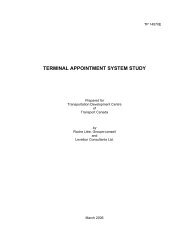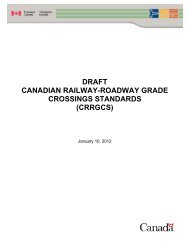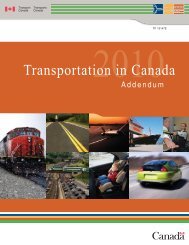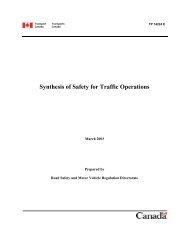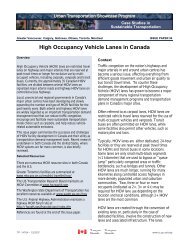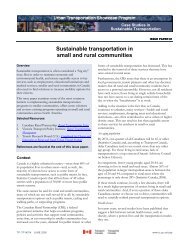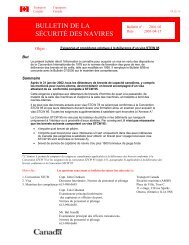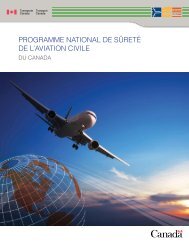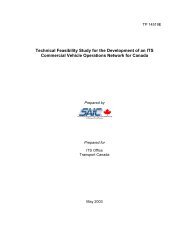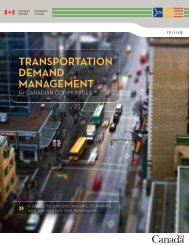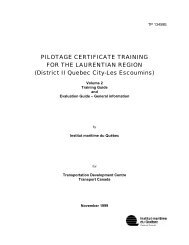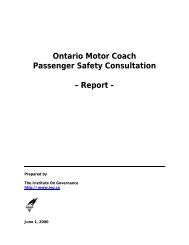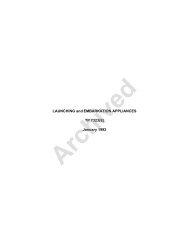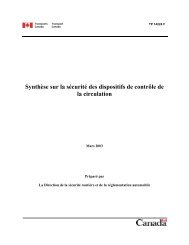Keith Vodden Dr. Douglas Smith - Transports Canada
Keith Vodden Dr. Douglas Smith - Transports Canada
Keith Vodden Dr. Douglas Smith - Transports Canada
Create successful ePaper yourself
Turn your PDF publications into a flip-book with our unique Google optimized e-Paper software.
Analysis and Estimation of the Social Cost of Motor Vehicle Collisions in Ontario<br />
economics, we have merged two sets of data. The first set is from the COMPASS<br />
system and consists of estimates of the time delays on Ontario freeways and major<br />
highways associated with motor vehicle collisions.<br />
COMPASS is an Advanced Freeway Traffic Management System developed by<br />
the Ontario Ministry of Transportation (MTO) to respond to traffic congestion problems,<br />
primarily on Ontario’s divided highways. COMPASS helps increase roadway efficiency<br />
and roadway safety by:<br />
• Allowing for the prompt detection and removal of freeway incidents and vehicle<br />
breakdowns.<br />
• Providing accurate and timely freeway incident and delay information to<br />
motorists.<br />
• Effectively managing peak rush hour traffic flow through a variety of traffic<br />
control devices.<br />
In this project, we have used data from the COMPASS system on delays as a<br />
critical data input. We have used COMPASS data from the MTO Toronto system (there<br />
are two other COMPASS systems in Burlington and Ottawa) covering Highway 401<br />
from Highway 410 to Brock Road These data are then extrapolated to the entire<br />
Province, on the basis of population data that we assume are related to traffic volumes.<br />
The methodology described in this section provides estimates of delays from<br />
motor vehicle collisions, measured in person hours. These delays are then combined with<br />
wage data from Statistics <strong>Canada</strong> for representative members of the population to value<br />
these time delay costs. In addition to these time delay costs, we have also estimated the<br />
incremental costs associated with the use of more motor vehicle fuel in a congested traffic<br />
context and the environmental costs associated with this additional and less efficient fuel<br />
use.<br />
b) Lost time<br />
The wage rate that we use to value time spent in traffic delays resulting from<br />
motor vehicle collisions is derived from Statistics <strong>Canada</strong> data on average wage rates<br />
(Statistics <strong>Canada</strong>-The Labour Market Cat. No.: 71-222-XWE). This value for 2004 is<br />
just under $18 per hour. There is an extensive literature including Small (1992) and<br />
Brownstone et al. (2002) that discusses what fraction of this wage should be used for<br />
traffic delays. Small argues that based on his review of an extensive literature in this area<br />
that the fraction should be 50%. The use of a fractional value reflects the fact that all<br />
persons delayed are not necessarily employed and that many passengers will be children.<br />
Brownstone et al. argue that revealed preference methods of determining willingness to<br />
pay show that commuters place quite a high value on time, possibly higher than the<br />
market wage. Substantial voluntary payment for reduced congestion on Ontario’s<br />
Highway 407 provides a related example of this willingness to pay.<br />
150 TNS Canadian Facts, Social and Policy Research



